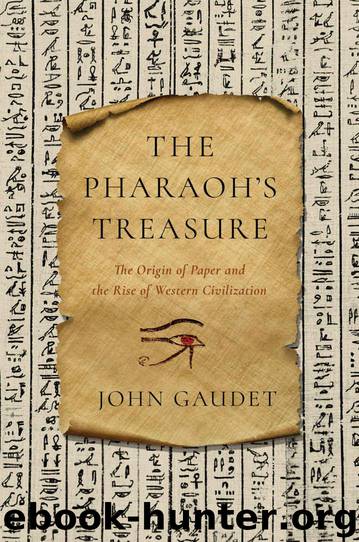The Pharaoh's Treasure: The Origin of Paper and the Rise of Western Civilization by Gaudet John

Author:Gaudet, John [Gaudet, John]
Language: eng
Format: azw3
Publisher: Pegasus Books
Published: 2018-10-01T16:00:00+00:00
EIGHTEEN
Roman Libraries
In order to appreciate the impact of papyrus paper on the daily life of the Romans in a more familiar setting, we could take a trip to my favorite library. This is a library that no longer exists, but when it did it was a bit different from the ordinary community or regional public library that many of us are used to. Not only was it located in Rome; it was situated on the south of the Coliseum inside the compound of the Baths of Caracalla. Another odd thing is that it lies mostly in the open space of the ruins.
On my way to Africa years ago, where I would begin my work on the ecology of the papyrus plant, I stopped over in Rome, where I saw a performance of Verdi’s Aida, a production that used to be staged in the Baths of Caracalla. The original opera had been commissioned by the Khedive of Egypt to celebrate the opening of the Suez Canal in 1869; so I thought this would be a great introduction to the early days of Africa and Egypt. It was first performed in Cairo and played for years in Rome where the ruins of the Baths evoked the ancient temples of Egypt. Little did I know as I watched the live elephant and dromedaries trooping across the stage that I was within a stone’s throw of a place where, at the height of Rome’s glory, hundreds of scrolls were kept, all inscribed on papyrus paper made originally in Egypt.
Plan of the Baths of Caracalla showing the two libraries. (after Giuseppe Ripostelli, The Thermae of Caracalla. Rome, 1914).
Download
This site does not store any files on its server. We only index and link to content provided by other sites. Please contact the content providers to delete copyright contents if any and email us, we'll remove relevant links or contents immediately.
Learning SQL by Alan Beaulieu(6282)
Weapons of Math Destruction by Cathy O'Neil(6267)
Digital Minimalism by Cal Newport;(5750)
iGen by Jean M. Twenge(5409)
Sapiens by Yuval Noah Harari(5366)
The Age of Surveillance Capitalism by Shoshana Zuboff(4279)
Elon Musk by Ashlee Vance(4121)
Thing Explainer by Randall Munroe(3930)
Apollo 8 by Jeffrey Kluger(3704)
Future Crimes by Marc Goodman(3592)
The Science Book (Big Ideas Simply Explained) by DK(3277)
The Innovators: How a Group of Hackers, Geniuses, and Geeks Created the Digital Revolution by Walter Isaacson(3165)
Who Can You Trust? by Rachel Botsman(3129)
I Live in the Future & Here's How It Works by Nick Bilton(2994)
Infinite Energy Technologies by Finley Eversole(2975)
Steve Jobs by Walter Isaacson(2889)
Dawn of the New Everything by Jaron Lanier(2770)
Chernobyl by Serhii Plokhy(2536)
Ben Franklin's Almanac by Candace Fleming(2524)
